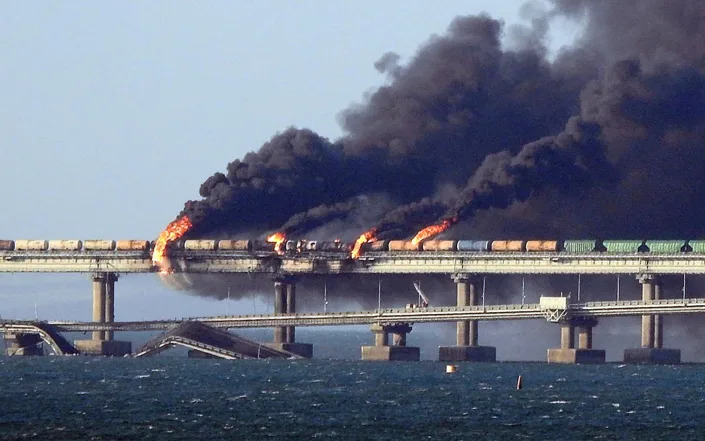The Telegraph
A total Russian collapse is surprisingly close
Colonel Richard Kemp – February 28, 2023

As Moscow’s latest offensive in Ukraine slowly but bloodily cranks up, the next phase of this ghastly war has well and truly arrived. Contrary to expectations, the Ukrainians are bravely, and successfully, resisting the tens of thousands of fresh Russian recruits being thrown at them. Nevertheless, according to many Western observers, the chances of a total Russian collapse in the coming year are slim.
I am less certain; we could be surprised. Far from being cowed, Zelensky’s government is emboldened. Kyiv is openly preparing its own major thrust against Russian ground forces in the spring. Vadym Skibitsky, Ukraine’s deputy military intelligence chief, said this week that this counter-offensive will aim to “drive a wedge” between Crimea and the Russian mainland. The Ukrainians are determined to, in his words, “liberate all occupied territories – including Crimea”.
Now, General Ben Hodges, former commander of US forces in Europe, has devised a strategy he believes would not only enable Ukraine to retake Crimea, but would precipitate a total Russian military implosion.
His suggestion is as follows: isolate the peninsula by precision strikes against the two land routes connecting it with Russian territory – the Kerch bridge and the corridor that runs along the Azov sea. Then follow up with a large-scale armoured drive towards the Azov, penetrating Russian defences north of Crimea, bringing rocket and artillery systems into closer range. Russian air, ground and naval forces in the peninsula would then be reduced by precision strike and bombardment, until the point when Ukrainian forces could launch a ground offensive along the Perekop Isthmus and into Crimea.
This concerted attack against the peninsula – isolating it, neutralising and inflicting severe damage against its military infrastructure by long range strikes – would be a major blow for Russian morale. In the absence of decisive battlefield success elsewhere, it would represent a defeat for Moscow that it could not disguise, and could lead to collapse of Russian forces in the field and even to Putin’s downfall.
I agree that this is desirable. But – as so often in this war – without boosting our support, it is unachievable. Even this more limited operation would demand massively increased Western assistance, including many more tanks than have been promised, much larger quantities of ammunition, as well as long-range missile systems which so far have not been provided at all. This additional support would have to be sustained and that would mean stepping up defence industrial production in the US and Europe beyond what has been contemplated so far in this war.
To achieve this is a question of political will on the Continent, one that remains shaky. There are signs now of European leaders pushing Zelensky towards peace talks with Russia rather than the defeat of Moscow’s invasion. That was the message delivered directly to the Ukrainian leader in Paris recently by President Emmanuel Macron and Chancellor Olaf Scholz. Both their countries have said they will not be providing new types of weapons this year. All talk at the moment is of future security assistance and guarantees to Ukraine from Nato after the war ends, as a means of pressuring Zelensky into an accommodation.
Putin recognises this wavering of Western support for Ukrainian offensive action and will be encouraged to press forward his own offensive to maximise territorial gains in advance of any potential negotiations. He is unlikely to achieve his full objectives on the battlefield, but neither will he willingly surrender what he now holds, which is significantly greater Ukrainian territory than when the war began.
With Ukraine denied the resources for decisive success, the scene would then be set for a period of relative quiet followed by the next round of Russian aggression. General Hodges’s plan for Crimea may be overly optimistic, but he is absolutely right to suggest that long-term peace is contingent on Russian battlefield defeat. The scenario that Nato leaders are now planning equals the vanquishment of the West and the emboldenment of both Russia and China. It is a crying shame when the possibility of a total Russian collapse remains within reach.
Colonel Richard Kemp is a former infantry commander
